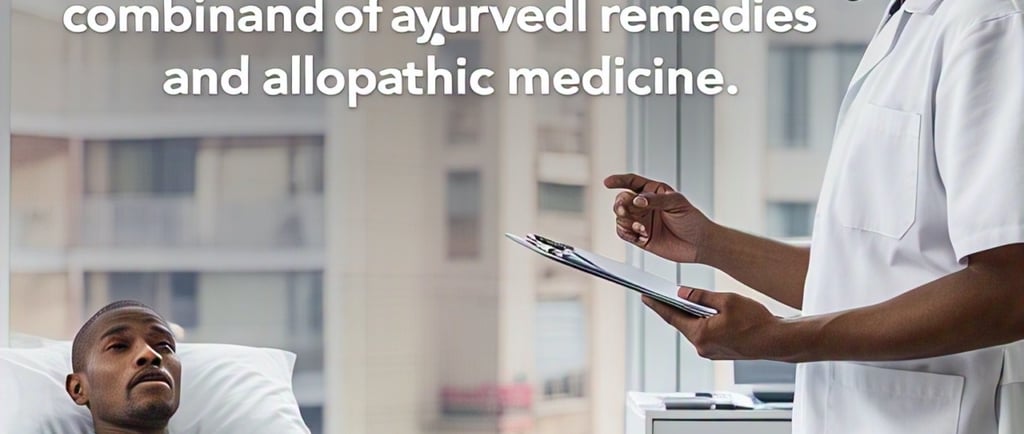Medicinal Options for Piles Treatment: Ayurvedic and Modern Approaches
Blog post description.
4/17/20252 min read


Piles, also known as hemorrhoids, are a common anorectal condition that affects people of all ages. They are classified into two main types — internal piles and external piles, each with distinct symptoms and treatment strategies. While surgical options exist for advanced cases, medical and Ayurvedic treatments play a vital role, especially in early stages and in symptom management.
Understanding the Types of Piles
1. External Piles (Thrombosed Piles)
External piles occur outside the anal canal and are often the result of excessive straining during defecation. This strain causes subcutaneous bleeding, leading to clot formation or thrombosis.
Symptoms:
Sudden and severe anal pain
A hard, painful lump near the anus
Discomfort during sitting or passing stools
In most cases, external piles resolve on their own within 7–8 days. During this period, treatment is focused on symptomatic relief.
Medical Management Includes:
Simple analgesics for pain relief
Hot sitz baths to ease discomfort and promote healing
Stool softeners or laxatives to avoid straining
High-fiber diet and hydration
Ayurvedic medicines to reduce inflammation and pain, especially those containing herbs like Haritaki, Daruharidra, and Guggulu
2. Internal Piles (Bleeding Piles)
Internal piles develop inside the rectum and may not be felt initially. They are classified into four grades based on severity:
Grade 1: Bleeding without prolapse
Grade 2: Prolapse that reduces spontaneously
Grade 3: Prolapse that requires manual reduction
Grade 4: Prolapsed piles that cannot be pushed back
Medicinal Management – Effective in Grade 1 and Grade 2
In early stages, both Ayurvedic and modern medicine are highly effective in controlling symptoms, reducing inflammation, and preventing progression.
Ayurvedic Treatment:
Ayurveda provides a natural approach to piles management using time-tested herbs and formulations.
Herbo-mineral tablets and powders that reduce inflammation and bleeding
Kashayams (decoctions) and churn-as to improve digestion and regulate bowel habits
Topical applications for soothing relief
Internal detoxifying herbs to maintain colon health
Some commonly used Ayurvedic formulations include:
Ayurlock: For bleeding control and inflammation
Ayurflam: Anti-inflammatory and gut soothing
Proctocool Suspension: For hot sitz baths and pain relief
Modern Medicine:
Topical creams containing local anesthetics or corticosteroids
Oral flavonoids to strengthen blood vessels and reduce bleeding
Stool softeners or bulk-forming laxatives
Pain relievers and anti-inflammatory drugs as needed
Diet and Lifestyle – The Backbone of Piles Treatment
Regardless of the treatment method, dietary precautions are essential:
High-fiber diet (green vegetables, fruits, whole grains)
Adequate water intake
Avoid spicy, fried, and processed foods
Regular bowel movements without straining
Avoid prolonged sitting and sedentary lifestyle
Conclusion
Medicinal treatment, whether Ayurvedic or allopathic, can effectively manage early-stage piles and reduce symptoms like pain, bleeding, and discomfort. For external piles, conservative management often suffices, while Grade 1 and Grade 2 internal piles respond well to non-surgical therapies.
At Bhardwaj Hospital, we combine the best of Ayurveda and modern medicine to offer holistic, personalized care for piles. If you're experiencing symptoms, early consultation and proper guidance can help you avoid complications and recover naturally.


Frequently asked questions
❓ 1. बवासीर क्या होती है?
बवासीर, जिसे हेमोरॉयड्स कहा जाता है, वह स्थिति है जब गुदा के अंदर या बाहर की रक्तवाहिनियाँ सूज जाती हैं या उनमें सूजन आ जाती है। ये अंदरूनी (Internal) या बाहरी (External) हो सकती हैं।
❓ 2. बवासीर के लक्षण क्या हैं?
- मल त्याग के समय खून आना
- गुदा क्षेत्र में दर्द, जलन या खुजली
- गुदा के पास गांठ या सूजन महसूस होना
- भारीपन या अधूरा मल त्याग की भावना
❓ 3. बवासीर के मुख्य कारण क्या हैं?
- लगातार कब्ज या मल त्याग में ज़ोर लगाना
- लंबे समय तक बैठना
- कम फाइबर युक्त भोजन
- मोटापा, गर्भावस्था, या अनुवांशिक कारण
- बार-बार दस्त
❓ 4. क्या बवासीर दवाओं से ठीक हो सकती है?
हाँ, ग्रेड 1 और 2 की बवासीर को आयुर्वेदिक और एलोपैथिक दवाओं से नियंत्रित किया जा सकता है। सही खानपान और जीवनशैली सुधारने से लक्षणों में काफी राहत मिलती है।
❓ 5. आयुर्वेद में कौन-कौन सी दवाएँ बवासीर के लिए उपयोगी हैं?
- Ayurlock Tablet – रक्तस्राव में लाभकारी
- Ayurflam Tablet – सूजन और दर्द में राहत
- Ayurheal Tablet – घाव भरने में सहायक
- Ayurgole Powder – कब्ज दूर कर मल त्याग को आसान बनाता है
- Proctocool Sitz Bath Suspension – दर्द और जलन में फौरन राहत
❓ 6. अगर दवाओं से राहत न मिले तो क्या विकल्प हैं?
जब बवासीर बढ़ जाती है (Grade 3 या 4), तो इन विकल्पों पर विचार किया जाता है:
- FGHAL (painless and bloodless technique)
- Chivate procedure
- Band Ligation
- Laser Surgery (काट-छाँट के बिना)
- Open / Closed Hemorrhoidectomy
❓ 7. लेज़र सर्जरी क्या है और क्या यह दर्द रहित होती है?
हाँ, लेज़र सर्जरी मिनिमली इनवेसिव, तेज़, और अधिकतर मामलों में पेनलेस होती है। मरीज 24-48 घंटे में सामान्य जीवन में लौट सकते हैं।
❓ 8. क्या बवासीर दोबारा हो सकती है?
यदि जीवनशैली और खानपान में सुधार न किया जाए, तो बवासीर दोबारा हो सकती है। लेकिन सही इलाज और नियमित फॉलोअप से इसे पूरी तरह नियंत्रित किया जा सकता है।
❓ 9. Bhardwaj Hospital में कौन-कौन सी बवासीर की सेवाएं उपलब्ध हैं?
- आयुर्वेदिक इलाज
- मिनिमल इनवेसिव सर्जरी (Laser, FGHAL, Banding)
- फिशर, फिस्टुला, और पिलोनाइडल साइनस का संपूर्ण इलाज
- अनुभवी डॉक्टरों की टीम और पूर्णतः सेनेटाइज्ड ओटी
How can I contact you?
You can reach us by call on 9140815001/email address/contact form link. We are always happy to answer your questions.
